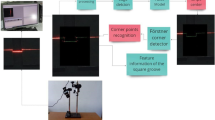Abstract
Identifying the situation of grinding wheel wear and loading is a very important issue for high efficiency grinding operations. This paper presents a new method that detects and identifies the chip loading and cutting edge wear of a grinding wheel using the image processing toolbox of MATLAB. The different optical characters of the metal chips and the abrasive grains are analysed. The Sobel operator is adopted to make edge detection. A sensitivity threshold based on the global condition is used to decrease the noise. Image dilation and erosion processes are used to ensure the edge of each loaded chip is covered by a continuous section. The ratios of chips are calculated and displayed to monitor the wheel surface working status.
Similar content being viewed by others
References
Suzuki H (1995) Development of 5 axis controlled ultra-precision grinding machine equipped with the system measuring and compensating profile error on the machine. In: Proceedings of symposium for key technology in precision machine, Shanghai, pp 291–294
Tonshoff HK (1995) Fast sensor system for the diagnosis of grinding wheel and workpiece. SME technical paper, SME, Dearborn, MI, pp 1–15
Taylor JS, Discotty MA, Dornfeld DA (1995) Investigation of acoustic emission for use as a wheel-to-workpiece proximity sensor in fixed-abrasive grinding. Lawrence Livermore National Laboratory, CA, UCRL-JC-121689
Inasaki I (1991) Monitoring and optimization of internal grinding process. Annals CIRP 41(1):359–362
Comes de Oliveira JF, Dornfeld DA (1994) Dimensional characterization of grinding wheel surface through acoustic emission. Annals CIRP 43(1):291–294
Davies ER (1998) Automated visual inspection, machine vision, 2nd ed. Academic, New York, pp 471–502
Sanz JLC, Petkovic D (1988) Machine vision algorithm for automated inspection of thin-film disk heads. IEEE T PAMI 10:830–848
Bahlmann C, Heidemann G, Ritter H (1999) Artificial neural networks for automated quality control of textile seams. Pattern Recogn 32:1049–1060
Tucker JW (1989) Inside beverage can inspection: an application from start to finish. In: Proceedings of the vision 89 conference, Reading, PA
Novini AR (1990) Fundamentals of machine vision inspection in metal container glass manufacturing. Proceedings of the vision’ 90 conference, Oxford, UK
Ker J, Kengskool K (1990) An efficient method for inspecting machine parts by a fixtureless machine vision system. Proceedings of the vision 90 conference, Detroit, Michigan
Torres T, Sebastian JM, Aracil R, Jimenez LM, Reinoso O (1998) Automated real-time visual inspection system for high-resolution superimposed printings. Image Vision Comput 16:947–958
Shafarenko L, Petron M, Kittler J (1997) Automatic watershed segmentation of randomly textured colour images. IEEE T Image Process 6:1530–1543
Li H, Lin JC (1994) Using fuzzy logic to detect dimple defects of polished wafer surfaces. IEEE T Ind Appl 30:1530–1543
Milan S (1999) Image processing analysis, and machine vision. International Thomson, London
Weeks Arthur R Jr (1996) Fundamentals of Electronic Image processing. IEEE Press, Washington
Pratt WK (1991) Digital image processing. Wiley, New York
Canny JF (1986) A computational approach to edge detection. IEEE T PAMI 8:679–698
Otsu N (1979) A Threshold Selection Method from Gray-Level Histograms. IEEE T Syst Man Cy 9(1):62–66
Duley WW (1983) Laser processing and analysis of materials. Plenum Press, New York
Acknowledgements
The authors acknowledge the support of the EPSRC, Wendt Boart and Rolls Royce.
Author information
Authors and Affiliations
Corresponding author
Rights and permissions
About this article
Cite this article
Feng, Z., Chen, X. Image processing of grinding wheel surface. Int J Adv Manuf Technol 32, 27–33 (2007). https://doi.org/10.1007/s00170-005-0319-Z
Received:
Accepted:
Published:
Issue Date:
DOI: https://doi.org/10.1007/s00170-005-0319-Z



